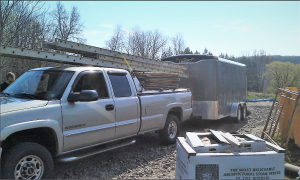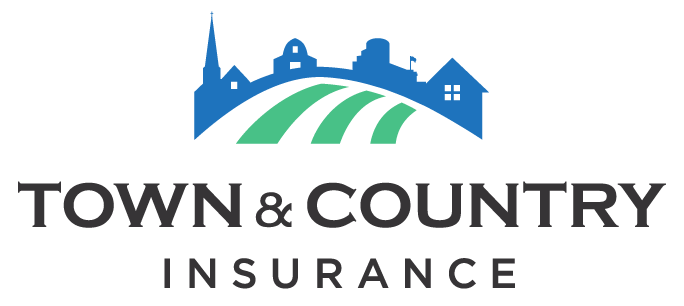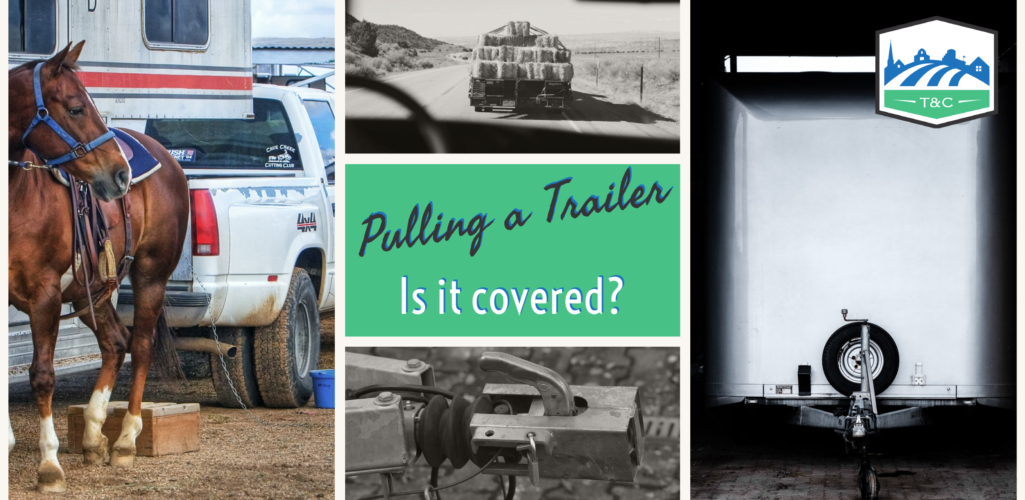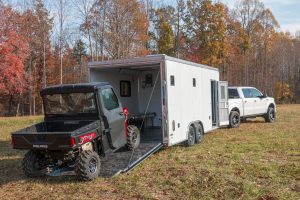You haul trailers, fish houses, campers & more…
…But what covers it in the event of an accident?
First, it is important to differentiate between Personal Auto insurance and Commercial (Business) Auto insurance. There are different answers, depending on the use of the property. You’ve probably been told that a trailer being hauled is typically covered by the towing vehicle. But this is only sometimes true.
Personal Insurance
On a personal auto policy, the liability is automatically extended from the vehicle that is towing it. This means that any damage caused to others will generally be covered; however the personal auto policy will NOT cover damage caused to the trailer itself. In order for the trailer’s damage to be covered, it needs to be specifically listed, with collision and/or comprehensive coverages, on your auto policy. Or, it should have its own stand-alone policy.
Let’s use an example. You’re hauling your new Ice Castle Fish House out to Mille Lacs for the winter, pulling it behind your insured truck. A deer runs out in front of you, you slam on your breaks,
hit ice, and your fish house slides into a nearby building. You have damage to your truck, damage to your fish house, and damage to the building it hit.
- Your truck’s damage is covered under your collision insurance, if included in your auto policy.
- The building’s damage is covered under your property damage liability included in your auto policy.**
- However, there is no coverage for the damage to your fish house, unless it is listed on your auto policy, and / or it has its own policy.
**Subject to policy limits.
Commercial Insurance
A commercial auto policy is completely different. The commercial policy does not have automatic liability coverages for trailers that exceed 2,000 lbs. If the vehicle you are driving is insured under a commercial auto policy, you need to list each trailer that exceeds 2,000 lbs. separately, in order to have coverage.
 Here’s another example. You’re hauling your company’s enclosed trailer (full of tools & equipment) out to a job site. A deer runs out in front of you, you slam on your breaks, hit ice, and your trailer slides into a nearby building. You have damage to your truck, damage to your trailer (including broken tools & equipment), and damage to the building it hit.
Here’s another example. You’re hauling your company’s enclosed trailer (full of tools & equipment) out to a job site. A deer runs out in front of you, you slam on your breaks, hit ice, and your trailer slides into a nearby building. You have damage to your truck, damage to your trailer (including broken tools & equipment), and damage to the building it hit.
- Your truck damage is covered under your collision insurance, if included in your business auto policy.
- The building damage is NOT covered under your business auto policy (because the liability does not extend on trailers over 2,000 lbs.)
- The trailer damage is NOT covered unless it is listed on your commercial business auto policy, or covered elsewhere.**
**Subject to policy limits.
To Further Complicate Things… Who Owns the Trailer?
The above scenarios become even more complicated depending on the ownership of the trailer and the towing vehicle. If both the vehicle and trailer are owned and titled in your personal name, the liability coverage is automatic. But if you have a business auto policy and are hauling trailers, you need to ensure they are titled correctly to receive the correct coverage. It is highly recommended that you consult with your insurance agent prior to purchase (and definitely prior to use) of any trailers. There are many questions that need to be addressed to ensure you have coverage.
Here Are a Few Questions to Ask:
- How is your business listed? As an individual (using your SSN for tax purposes) or as a corporation, LLC, etc. (using a TIN for tax purposes)?
- How is your towing vehicle titled? In whose name is it titled… your personal name or the business name?
- What type of policy is it listed on? Personal or Commercial? (Note, if #2 and #3 are not the same answer contact us right away!)
- How is your trailer (fish house, camper, etc.) titled? Your personal name or the business name?
- Is your trailer listed on an insurance policy? Is it on a stand-alone policy or listed elsewhere on another policy?
- Do you have a personal auto policy?
Here are a few resources from the State which may be helpful as well:





